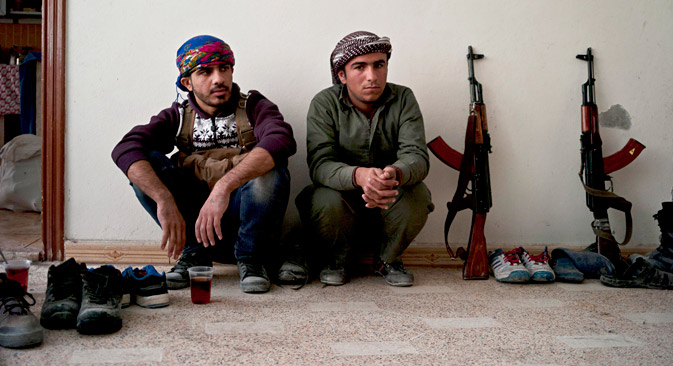
Kurdish fighters in Kobani, Syria, Nov.1, 2014. Source: AP
APThe Russian media have commented on American press reports regarding U.S. intentions to step up the military campaign in Syria against the Islamic State extremist group (ISIS) as Russia carries out air strikes against alleged ISIS targets.
Citing The New York Times, the business daily Kommersant reports on the U.S.-led coalition plans to launch a general offensive on the city of Raqqa in the northeast of Syria – the de facto capital of ISIS.
The ground operation will be based on 20,000 Kurdish militants and about 5,000 fighters with the moderate Syrian opposition, who will receive air support from the coalition forces.
The Russian experts interviewed by the newspaper say that two alternative coalitions are now being formed – one led by Russia and another by the U.S. – who are competing for the victory garland in the fight against the Islamists.
"<...> In this situation, it is important that the parties are guided by the principle of 'do no harm,'” said Dmitry Polikanov, a member of the board of the Center for Political Studies in Russia, is quoted as saying.
“This requires clearly delimiting zones of operations and weighing one's steps. For example, the U.S. decision on the direct delivery of weapons to the Syrian opposition could lead to a situation where these weapons end up in the hands of terrorists," said Polikanov.
According to Ruslan Pukhov, director of the Center for Analysis of Strategies and Technologies, a settlement in Syria will require not only the actions of the coalition against ISIS, but a peace process.
"To fight ISIS is very difficult. It is like punching into cotton wool or in the fog. After such attacks, ISIS comes apart and then closes ranks again," Sergei Oznobishchev, director of the Institute for Strategic Assessments, told Kommersant.
According to him, in this situation, the struggle against ISIS launched by Russia and the U.S.-led international coalition becomes more of an argument about who is able to play first fiddle in world politics.
The Russian media have also reacted to a Financial Times report that with its "sudden intervention" in Syria, Russia has ruptured months of negotiations between the U.S. and other members of the U.S.-led coalition on establishing a no-fly zone, according to a project proposed by Jordan and Turkey.
But experts whose opinions are cited by the centrist daily Nezavisimaya Gazeta doubt that the Russian Federation had a hand in the disruption of the project and believe that the West is still trying to drive a wedge into the alliance against ISIS that is emerging under Moscow’s wing.
A Nezavisimaya Gazeta source at the Russian Foreign Ministry said that Moscow did not know about the plans of the West to establish a no-fly zone, and added that the topic was not raised at the talks at the UN General Assembly in New York in late Sept.
"I do not know about the disruption of the plan to establish a no-fly zone, but I know exactly that the U.S. was against a no-fly zone, which Turkey proposed to establish in Syria, even before any interventions, and Russia has nothing to do with it," said Alexander Ignatenko, President of the Institute of Religion and Politics, in an interview with Nezavisimaya Gazeta.
According to him, there is a desire in the West today to "blow apart the emerging united front against ISIS and related terrorist organizations," some of which are partially supported by Turkey.
Ankara has reported a second violation of its airspace by Russian pilots, reports the business daily Vedomosti.
According to the newspaper, on the evening of Oct. 5 the Turkish Foreign Ministry summoned Russian ambassador Andrei Karlov once again to protest over the second violation of Turkish airspace by a Russian warplane. The first infringement, which occurred on October 3, was reported on the morning of Oct. 5.
The Russian foreign and defense ministries admitted this violation. As the military department's spokesman, Major-General Igor Konashenkov, said, "this incident is a consequence of poor weather conditions in the area."
All rights reserved by Rossiyskaya Gazeta.
Subscribe
to our newsletter!
Get the week's best stories straight to your inbox